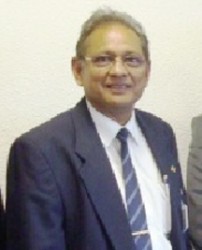With sections of the private sector being caught flat-footed by the new 40-hour work week and the $35,000 minimum wage, the employers’ body, CAGI has been blamed for not adequately disseminating information, a charge its head has dismissed.
While a five-day, 40-hour work week had been talked about for many years, who was privy to the decision-making has been queried by sections of the private sector. The decisions had been made at a tripartite meeting comprising the government, the unions and the Ministry of Labour and only transmitted to sections of the private sector in late May for implementation on July 1st. Security services and other businesses which have been contracted on old wage rates have since complained about the impact on their bottom line. One security firm RK’s has already announced the abrogation of several contracts and other companies have abandoned working on Saturdays to limit costs from the five-day, 40 hour work week. The contretemps could likely lead to changed representation for the private sector at tripartite meetings.
In an interview with Stabroek News last week, Executive director of the Consultative Association of Guyanese Industry (CAGI), Samuel Goolsarran stated that “I don’t work for the Chamber and the (tripartite) committee, the discussions were at the ministry level”. When Sta-broek News asked Goolsarran if it wasn’t CAGI’s responsibility as the private sector representative to relay information to the other two private sector bodies in the country, he said that both the Georgetown Chamber of Commerce and Industry (GCCI) and the umbrella Private Sector Commission (PSC) could have gone to CAGI requesting information.

He said that while the tripartite committee met on a monthly basis, with six representatives from CAGI, six from the trade unions and six from the ministry, CAGI would then host meetings every two months and the information from the committee would be relayed to members. Stabroek News questioned Goolsarran on why the information wasn’t passed along to the GCCI and the PSC to which he responded that the majority of CAGI members were affiliated with one or both of the organizations. Stabroek News inquired then if the expectation was for members to chanel information to the umbrella organisations they came under. Goolsarran did not answer the question.
He re-emphasised that as the head of CAGI his obligation was to the 58 members of the body and that the PSC and the GCCI had a responsibility to seek out information. Goolsarran noted that on May 29, a day after the official decision was made to go ahead with the new five-day work week and the new minimum wage regulation he forwarded the decision to all members of CAGI, the PSC and the GCCI.
Stabroek News pointed out to him that much of the criticism from the other private sector bodies was that as CAGI was the private sector representative at the tripartite committee level it had an obligation to fully communicate any and all dialogue. Goolsarran then said that over 18 months ago when the labour ministry was first starting negotiations Clinton Urling, recently re-elected President of the GCCI and former Vice Chairman of the PSC was present. However Goolsarran was unable to recollect when exactly this meeting took place and whether there had been a serious discussion of it.
Urling when contacted by Stabroek News stated that the meeting which Goolsarran was referring to was held at a somewhat informal level to gather information. Urling said that “I met with the ministry and others at an exploratory meeting to map out a strategic plan a year or so ago”. Urling stated that “this meeting focused on the minimum wage and has zero relevance to the tripartite committee and those discussions, which happened at a different time.”
Urling stated that the private sector was aware that a five-day work week was on the horizon and a new minimum wage, “we have no problems with that,” but continued that CAGI has set a precedent in which the body has showcased that it cannot communicate findings which would affect the entire private sector during negotiations at the national level. Urling said that “it is dubious that CAGI is representing the private sector, they are the major negotiator on this national initiative and the information has been inadequately relayed.”
Urling questioned then what the point of CAGI was at the tripartite level. He noted that while both the PSC, GCCI and CAGI were all sectoral bodies only one was present at the national level and as a result it was not the GCCI or the PSC that had to request information, but for CAGI to deliver it. He said that CAGI “dropped the ball on this, no one is saying that the $35,000 minimum wage is a problem and the five-day work week we can work around, but preparations had to be given the adequate amount of time.

Urling said that once the negotiations were complete and CAGI sent out the information it was essentially a month’s notice before the July 1 implementation. Recently re-elected Chairman of the PSC Ronald Webster had previously told Stabroek News that the changes to the order under the Labour Act are “not as simple as it appears… there will be problems for shops, stores and those in the garment and agriculture sectors,” he said. “These are hurdles which we will have to look at to see how we could come up with answers,” he said.
Webster had raised the issue of compressing a six-day work week to five days. He said that new regulations could be problematic for 
When Stabroek News visited Goolsarran’s office he was inundated with questions and concerns from various businesses and employers seeking clarification on what exactly the new regulations mean for them and their employees.
While the implementation date has come and gone and employers from all business sectors are scrambling to redefine how their business will be handled various private sector umbrellas like the PSC and the GCCI are hoping for more inclusion at the national level.
Minister of Labour Dr Nanda Gopaul told Stabroek News in an invited comment that during the discussions at the tripartite committee level mistakes were made and moving forward the private sector representation would have to be broadened.
Gopaul stated that “it was my understanding and from my information that from the discussions the information was being distributed”. He noted that the private sector’s frustration that they were not given an adequate amount of time to prepare for the decision was disappointing. The minister stated that CAGI as the private sector representative at the tripartite committee had a responsibility to pass along information as it was discussed to both the PSC and GCCI.





